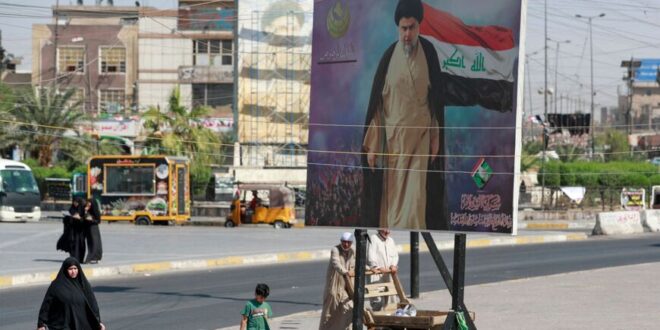The victory of the coalition led by populist cleric Muqtada Al-Sadr, and the rise of independent Shiite politicians, could foreshadow a new chapter in Iraqi politics.
Final results of Iraq’s Oct. 10 elections were announced on Oct. 18. The results are expected to be approved by the federal court in two weeks without a major change.
Shiites have divided into three main groups: Sadrists with 73 seats, Nouri Maliki’s State of Law with 34 seats and the Popular Mobilization Unit’s Fatah with 17 seats. This is in addition to the majority of independents (about 40) who mostly are Shiite.
The results sent shockwaves nationwide, both in joy and disbelief. Many in the pro-protest movement cheered the electoral defeat of their primary foe: the Fatah Coalition, a powerful alliance of pro-Iran militias widely accused of killing and intimidating protesters. The coalition went from 48 seats in the 2018 election to 17 seats in the recent election, a more than 60 percent reduction. But the losing coalition’s politicians and supporters, refusing to acknowledge defeat, campaigned to discredit Iraq’s Independent High Electoral Commission (IHEC), and issued thinly veiled threats that “social peace” would be disturbed if election results stood.
As IHEC stood by the results, Fatah heated up the rhetoric, asking its supporters to take to the streets in protest. It was a poor showing: a few hundreds in Baghdad and other cities in the south and the middle Euphrates region. People close to Fatah raised the possibility of resorting to arms “to correct the results.” The government responded by deploying security forces in Baghdad and elsewhere, signaling its readiness to respond to any armed breach of the peace.
What lends Fatah’s rejection some teeth is its political arm. The “Coordinating Framework” was originally designed to “coordinate” the positions of the Islamist Shia players, including the Sadrists, in the outgoing parliament. Although ineffective, the framework has been quickly revived following the election, to oppose its new realities. But like all other coordinating efforts among these groups since 2003, this one is likely to fail because its members’ interests vary.
Ammar al-Hakim and Haidar al-Abadi are ready to give up once the legal avenues are exhausted and to organize for another day while trying to keep as many as their pre-election gains as possible. Former prime minister Nouri Maliki’s State of the Law bloc, the only winner in this alliance of electoral losers, wants to use the group’s leverage to force Muqtada al-Sadr to negotiate some sort of a partnership deal.
Fatah, however, views this as an existential fight. In addition to maintaining the state patronage it has earned through its electoral gains in 2018 and its political sponsorship of Hashd, Fatah is motivated by ideological considerations too. As an important part of Iran’s regional axis of resistance, it wants to continue using its militias to align Iraq with Iran’s interests.
Fatah’s current bravado cannot lead it anywhere electorally. The election results will stick, given the international and Iraqi government support for IHEC. Iran’s intervention is Fatah’s best bet. In his victory speech, al-Sadr’s emphatic promise to rein in the militias and adopt an even-handed approach in Iraq’s foreign relations (a carefully worded hint of openness towards the US) was enough to worry Iran.
Iraqi sources speak of Iran “mediating” efforts to bring together all the Shia players, the Sadrists and the Coordinating Framework members, under some kind of “unifying” arrangement that basically reinstates previous practices: the different Islamist Shia players first agreeing on a premiership candidate and a government program, then approaching the Sunnis and the Kurds with this unified position to win their support too.
Prioritizing Shia political identity over electoral wins, such an arrangement appeases many Shia losers, but it would essentially dilute if not outright strip the Sadrists of their electoral win. More importantly, the arrangement would produce an ineffective governing formula, basically repeating the structural failures of post-2003 governments where decision-making was hard, responsibility dodged and performance consistently poor.
Al-Sadr’s challenge lies exactly here: to translate his electoral win into a political win. In this still ethno-sectarian power-sharing system, he becomes the sole or at least dominant Shia player in government formation, possibly entering into a deal with the Sunnis and Kurds to form a majority government. This would be a new governing formula where the Sadrists enjoy the privileges of governing while taking responsibility for both failures and success. An accountable majority government would be a step in the right direction.
What complicates this scenario is that the Sadrists did not carry the majority of the Shia vote. This leaves al-Sadr with two scenarios. He could ally himself with Maliki while ignoring the other framework’s members such as Fatah, a very hard pill for al-Sadr to swallow. Or the Sadrists could negotiate a deal with the non-Islamist Shia winners in the election, more than 40 new independent and pro-protest members of the parliament. This deal could involve the non-Islamist members voting for the Sadrist government passage through the parliament, but without participating in the government itself, hence maintaining their opposition status. Indeed, there is already some initial talk about this between the two sides.
Such a deal would strengthen al-Sadr’s claim for Shia representation and help him against Iranian pressure. On his side, al-Sadr would need to do something to bridge his gap with the protest movement which he previously targeted. The new “opposition” members would weaken their foes, the Shia “old guard” whose governing failures and corruption led to the protest movement, in the first place.
In Iraq’s current difficult moment of transition, this marriage of convenience can work.
 Eurasia Press & News
Eurasia Press & News



